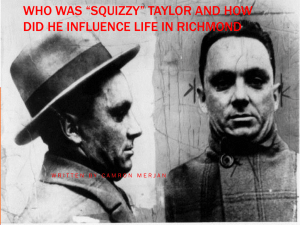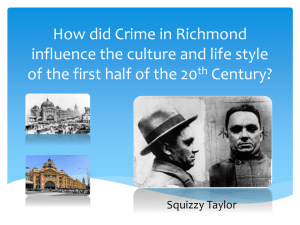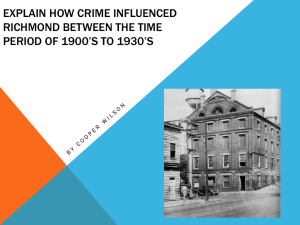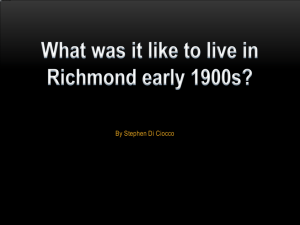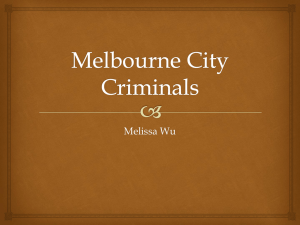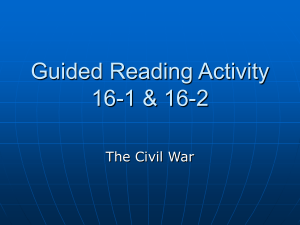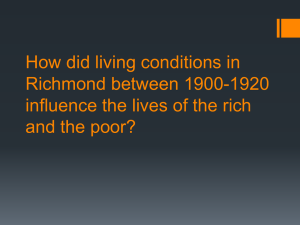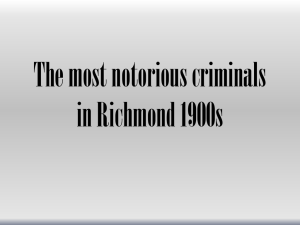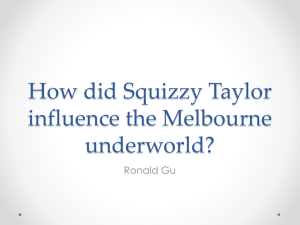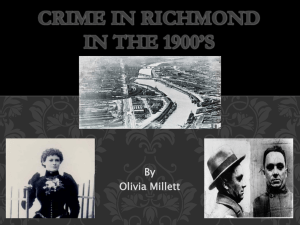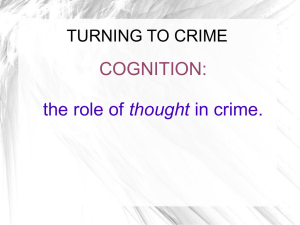Lachie walshj
advertisement
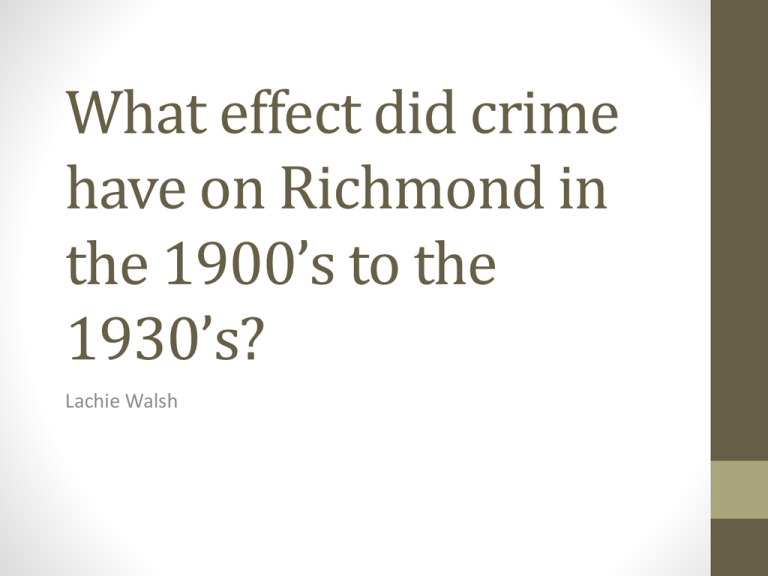
What effect did crime have on Richmond in the 1900’s to the 1930’s? Lachie Walsh What effect did crime have on Richmond life in the 1900 1930? • 1. Who was behind the major crimes in Richmond? 2. When did crime become ‘big’ in Richmond? 3. How did the authorities respond to the crime? 4. How was the law broken? 5. Why did these people get involved? 6. What sparked major crimes in Richmond? 7. Who were the faces of the major gangs? 8. Who was Squizzy Taylor? 9. Who were other well known criminals? 10. How did crime affect the citizens of Richmond? Notable Events 1. Fitzroy Vendetta 2. Death of Squizzy Taylor Conclusion and Bibliography 1. Conclusion 2. Bibliography Who was behind the major crimes in Richmond? • Squizzy Taylor was a well known criminal and gang leader in Richmond; he founded the first gang of Richmond. He became notorious in 1919 as we was part of many major robberies and murders. He was also a major part of the ‘Fitzroy vendetta’ gang fight. When did crime become ‘big’ in Richmond? • Crime was always around in Richmond but once Squizzy Taylor was a household name, it was as if crime had an identity. Even if he did not commit them, Taylor often took credit for crimes to make his legacy a lasing one. How did the authorities respond to the crime? • Upon crimes being committed the accused is entitled to a fair trial, if the defendant is found guilty, they can be taken to jail for the appropriate amount of time or repay their crime in other ways. How was the law broken? • The law was broken in many ways by the criminals, some as simple as pick pocketing (this is how a lot of the criminals got started) and more serious ways like theft, street fights murders and assault. Why did these people get involved? • As mentioned earlier, these criminals got started by such crimes as pickpocketing, but the root of their criminalistics way was often caused by lack of money, family problems and getting mixed up with the wrong people. What sparked major crimes in Richmond? • As other gangs formed people thought it was good to have a similar group, as these formed it expanded leading to more and more crime. Plus, it was an easy way to get money and repay debts. Who were the faces of the major gangs? • As well as Squizzy Taylor, Paddy Boardman and Henry Stokes were co-leaders with the Richmond gangs, whereas, Ed Whiting, Henry Slater, and Frederick Thorpe were the faces of the rival gang of Fitzroy. Will add pictures Who was Squizzy Taylor • Squizzy Taylor was a very well known criminal in Richmond; responsible for the Fitzroy vendetta and many other crimes. He is one of the few criminals who's name has remained until this day. He was a clever man, and although he was only 156cm in height, he had piercing dark eyes to intimidate his foes, and a powerful mind, to outwit them. Who were other well known criminals? • Another well known criminal was Martha Needle. She was a dull woman who lived in suburban Melbourne, it was as if there was nothing different about her. But, on the inside she was a whole different person. She was a murderer, who used a range of poisons to claim her victims. Will add pictures How did crime affect the citizens of Richmond? Citizens are always affected by crime, but more so in the 1900s to the 1930s, as we as a modern society have more control over crimes now. Citizens would be frightened and nervous to go into public areas especially with the notorious Squizzy Taylor around. A lot of pressure would be put on shop owners, especially jewellers and bank workers, as they were often targeted for crimes in the 1900s to the 19300s, and still are now. Fitzroy Vendetta • The ‘Fitzroy Vendetta’ begun when Fitzroy's members were taken to court for stealing from a jeweller, it was suspected that Squizzy Taylors men had given a hint to the police. This lead to an aggressive verbal disputed, leading to punches being thrown to Taylor and his co-leader, stokes. To add to the problem, Taylor's wife, dolly, was drugged, abused and robbed of her £200 jewellery. Taylors men retaliated furiously to the men responsible for his wife's mistreatment. Taylor invaded, his enemy, Edward whiting's home. Whiting was shot several time, but survived thanks to his ‘extremely thick skull’ this was only the beginning of many retaliations. May of ‘19 was the peak of havoc in Richmond. Within the span of a few days, a Richmond member was shot, a Fitzroy meme was brutally bashed by the Fitzroy gang, whiting house as once again invaded, but by late 1919 the feud had died down. Death of Squizzy Taylor • Taylor was fatally wounded in a gun fight with his long-time enemy John ‘Snowy’ Cutmore in 1927. Taylor heard about his Cutmore’s return from Sydney back into Melbourne and set out to find him. After an exchange of words, there were shots fired, one had hit Taylor below the ribs on the right side. He was rushed to St Vincent's hospital, the location of his death. Will add pictures Conclusion Crime affected Richmond and its citizens very much. It changed the way people live, and changed the way we lived today as it enhanced our justice system. Without the crime in the early 1900’s he would not be as knowledgeable as we are for having gone through that. We now know a lot more about society and how people act. Swan street. Bibliography • Squizzy Taylor." Wikipedia. Wikimedia Foundation, 09 July 2012. Web. 19 Sept. 2012. <http://en.wikipedia.org/wiki/Squizzy_Taylor>. • "Australian Dictionary of Biography." Biography. N.p., n.d. Web. 16 Sept. 2012. <http://adb.anu.edu.au/biography/taylor-joseph-lesliesquizzy-8762>. • Loh, Morag Jeanette. Growing up in Richmond, 1891-1966. Richmond, Vic.: Richmond Community Education Centre, 1979. Print.
